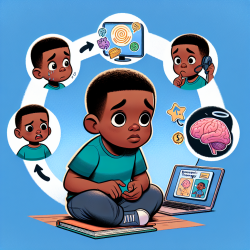Understanding Intellectual Humility in Practice
In the dynamic field of speech-language pathology, practitioners are constantly seeking ways to enhance their skills and improve outcomes for children. One promising avenue for professional development is the concept of intellectual humility, as explored in the research article "Development and validation of a multi-dimensional measure of intellectual humility." This study provides a comprehensive framework for understanding intellectual humility, which can be instrumental in fostering better therapeutic relationships and outcomes.
Key Dimensions of Intellectual Humility
The research identifies four core dimensions of intellectual humility: Open-mindedness, Intellectual Modesty, Corrigibility, and Engagement. These dimensions are crucial for practitioners who aim to improve their interactions with children and colleagues.
- Open-mindedness: This involves acknowledging the limitations of one's knowledge and being receptive to new information, which is vital in adapting therapy approaches to suit individual children's needs.
- Intellectual Modesty: Practitioners who exhibit intellectual modesty are less concerned with their intellectual status and more focused on the child's progress, fostering a more collaborative and supportive environment.
- Corrigibility: This dimension highlights the importance of being open to feedback and willing to adjust one's methods, which can lead to more effective therapy outcomes.
- Engagement: A commitment to actively engage with new ideas and perspectives can enhance a practitioner's ability to innovate and implement evidence-based practices.
Applying Intellectual Humility in Practice
Practitioners can apply the principles of intellectual humility by incorporating the following strategies into their practice:
- Embrace Continuous Learning: Stay updated with the latest research and methodologies in speech-language pathology to ensure that your practice is informed by the most current evidence.
- Foster Open Communication: Encourage open dialogue with colleagues and families, valuing diverse perspectives and feedback to enhance therapeutic approaches.
- Reflect on Personal Biases: Regularly assess your own beliefs and biases to ensure they do not hinder the therapeutic process or the child's progress.
- Encourage Collaborative Problem-Solving: Engage in collaborative discussions with peers to explore different strategies and solutions for complex cases.
Encouraging Further Research
While the research provides a robust framework for understanding intellectual humility, it also opens avenues for further exploration. Practitioners are encouraged to engage in ongoing research to explore how these dimensions can be integrated into specific therapeutic contexts and to measure their impact on child outcomes.
To read the original research paper, please follow this link: Development and validation of a multi-dimensional measure of intellectual humility.










